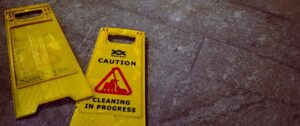
Slip and fall accidents are among the most common personal injury claims in Florida. These incidents often result in injuries ranging from sprains and fractures to more severe conditions such as head trauma or spinal damage. Establishing liability in slip and fall cases can already be complex, and the presence of adverse weather conditions adds another layer of difficulty. Rain, puddles, and slippery surfaces may seem like unavoidable hazards, but property owners still carry a legal duty to maintain safe premises. At Aronberg & Aronberg, Injury Law Firm, we work to clarify how weather influences liability and what victims should know when pursuing claims.
Premises liability law holds property owners and occupiers accountable for ensuring that their spaces are reasonably safe for visitors. In practice, this means they must anticipate risks, take steps to correct hazards, and provide adequate warnings when dangerous conditions exist. Weather does not absolve property owners of these responsibilities. For example, while rain is natural and unavoidable, property managers are still expected to address water accumulation, place warning signs, or use mats in entryways to reduce the risk of slipping.
Florida’s frequent rainstorms create slippery sidewalks, parking lots, and building entrances. If rainwater is tracked indoors, floors can quickly become slick. Business owners are responsible for monitoring these conditions and taking reasonable measures to prevent accidents. Courts often consider whether the owner knew or should have known about the hazard, how much time passed before action was taken, and whether proper signage or barriers were in place.
Puddles in parking lots or near entrances are another common cause of falls. Poor drainage or uneven pavement may cause water to collect, creating hazardous conditions. In these situations, liability often hinges on whether the property owner neglected to maintain the surface or failed to repair known drainage issues. A temporary puddle during a storm may be unavoidable, but recurring water accumulation that remains unaddressed can point to negligence.
In some jurisdictions, courts apply a “natural accumulation” rule, which limits property owner liability for hazards created directly by weather. Florida courts, however, focus more on whether owners took reasonable steps to protect guests once the hazard became apparent. The central question is not whether rain or weather caused the condition, but whether the property owner responded appropriately.
Slip and fall cases that involve weather require strong evidence. Victims should document the scene immediately after the accident by photographing puddles, wet floors, or the absence of warning signs. Witness statements can confirm whether property staff were aware of the hazard or failed to act. Medical records are also critical for establishing the seriousness of injuries and connecting them directly to the fall. An experienced attorney can investigate whether the property owner had policies in place for handling weather-related hazards and whether those policies were followed.
Weather complicates liability because it raises questions about what is considered “reasonable.” Business owners often argue that rain or puddles were beyond their control, while victims must show that neglect or inaction contributed to the accident. Attorneys play an essential role in bridging this gap by gathering evidence, consulting experts, and presenting a clear case that demonstrates negligence. Without professional guidance, victims may find it difficult to overcome these arguments and secure the compensation they deserve.
Weather conditions may make slip and fall accidents more common, but they do not eliminate the responsibilities of property owners. Rain, puddles, and wet entryways must still be addressed with care and attention. Victims injured under these circumstances should understand that liability depends on whether reasonable measures were taken to ensure safety.
At Aronberg & Aronberg, Injury Law Firm, we are committed to protecting the rights of slip and fall victims. If you have been injured in a weather-related fall, we are prepared to evaluate your case, build a strong claim, and help you pursue the compensation you need to recover.